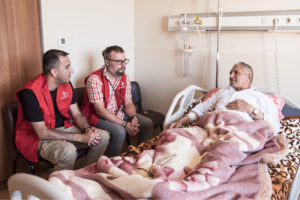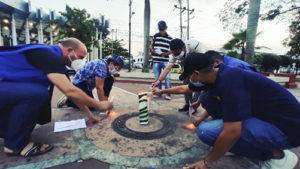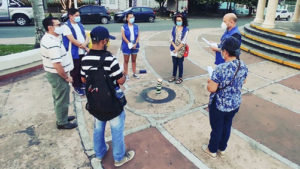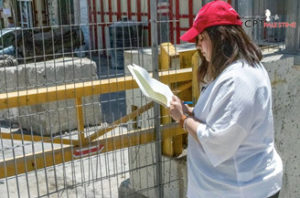Our movements [organizations] themselves have to be healing, or there’s no point to them.
—Cara Page
Community Peacemaker Teams (CPT, originally Christian Peacemaker Teams) works in areas of conflict around the world, in solidarity with those who are targeted by violence and oppression. CPT was founded thirty-five years ago by Anabaptist and other peace churches who heard the call of Jesus to actively work for peace as rigorously as the military has championed war. CPT is committed to building partnerships to transform violence and oppression in places such as Iraqi Kurdistan, Colombia, Palestine, the US/Mexico border, First Nations land in Canada/Turtle Island, and Greece.
As COVID-19 pandemic measures closed borders and halted international travel, CPT, as an international organization, paused to discern how best to continue or reimagine the work of accompanying communities that were under threat of violence. Many parts of the world went into a series of lockdowns, and violent and oppressive forces capitalized on pandemic measures as a cover to increase their violent acts against the people we partner with. By summer of 2020, despite some of our staff being unable to travel to rejoin their teams, we were able to resume CPT’s work on the ground. In Palestine, for example, our team re-started physical accompaniment and presence with an all-Palestinian team for the first time in the twenty-five years CPT has worked in Al-Khalil/Hebron in the West Bank.
Even in pre-pandemic times, those of us working with CPT regularly encountered systemic oppression as we listened to the stories of those targeted by violence and supported their nonviolent resistance. Recognizing the impact of these experiences upon staff, CPT’s Undoing Racism Coordinator Sylvia Morrison, along with others at CPT, began the work of helping us become a trauma-responsive organization. This meant understanding that our work may be traumatizing and trying to prevent that trauma from becoming stuck, building up, and having a negative impact on us.
Over time we have built structures to support the well-being of CPT members, using the framework of Healing Justice to sustain ourselves as a community and individuals for the long haul. The Healing Justice practice grew out of the Southern United States social movements for racial justice and is defined by Cara Page and the Kindred Southern Healing Justice Collective as follows:
Healing justice is the practice of reimagining wholeness at the intersection of intergenerational trauma, current structures of oppression, and a generative and co-created future. We hold that joy and pleasure create possibility to be in right relationship with ourselves, each other, and the land. We strive to demystify medicine and healing, and to make them accessible to everyone. We believe that each person is an expert of their own experience, body and needs, and that it is necessary to address the roots of trauma and injustice for individual and collective transformation.1
Healing justice is the liberating path we seek to follow and invite others into, that centers indigenous communities, people of color, and the LGBTQ community in healing from intergenerational trauma and current trauma. It is the practice of looking at wholeness and wellness imaginatively. It is more than just thinking about self-care or taking care of oneself at the expense of the group; instead, it recognizes that our movement for liberation MUST put healing and care at the center so that we can all stay motivated in our work and avoid burnout, quitting, or hurting each other. The COVID-19 pandemic can and has exacerbated trauma, so it has been important for CPT to give closer attention to strengthening structures and practices that mitigate trauma, build resilience, offer healing, and connect us with one another.
In times of crisis, this is one of our strongest assets—connection to one another. While the pandemic kept CPT members physically separated from one another and from many of our partners on the ground, we worked to promote and attend to the well-being of all of our staff. Relationships offer joy, break us out of isolation, and invite others to compassionately witness what we are going through. Although we were only able to gather as an international community virtually, we began meeting weekly to ground and center ourselves spiritually and to check in on one another and offer support. We made space to collectively grieve the losses experienced during the pandemic. We held virtual “coffee hour” and shared life stories.
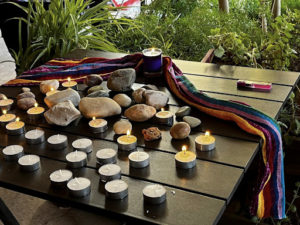
As the pandemic wore on, some of our workers began to experience symptoms of anxiety, depression, pandemic fatigue, and vicarious trauma. We identified the need for pyschoeducation and offered workshops on these symptoms for CPT members.
Even in non-pandemic times, we recognize the need to continuously offer space to process our experiences, both as teams and individuals. So when tensions run high because of stress, we invite space to name what is hard, to speak about the impact of oppression, and to heal as individuals. “I went through ups and downs from what I observed in the H2 area (controlled by Israeli military occupation), and one of the things that helped me to continue working was the system of care that we have,” reflected a Palestine team member. “We do check-in sessions monthly with coordinators, which reminds me of the care plan I should do for myself, not to mention other team care practices. Without this system of care, I couldn’t be able to work and have a normal life in a stress-and-dangers place we work in.”
We need space to ask for support from our teammates, to draw out the strength and courage that we see in each other. We need to remind each other of what keeps us hopeful, why we do this work, and what matters at the deepest part of our beings. We need to stop together and listen for the quiet signs of liberation that break through even during tremendous suffering. One of our frequent rituals is a practice of naming what connects us spiritually to our work and why we continue to do the hard work of collective liberation.
Through the concept of healing justice, we know that resisting and breaking apart systems of oppression is itself the most important factor in our resilience and care for our community. Our collective liberation comes through creating a world where all people are free. Every time we train people in Iraqi Kurdistan in the tactics of nonviolence or provide unarmed civilian protection to a social leader in Colombia, we strengthen the worldwide resistance to military and armed forces of oppression.
With the majority of our field team members coming from the places where they serve, our CPT work has a new depth to it.2 This also brings an increased risk of team members experiencing effects of trauma, as they are targeted by the same systemic oppression they are witnessing and documenting. For example, our Palestinian teammates are subject to the same checkpoints in Al-Khalil/Hebron that they monitor for human rights violations. Recently, I spent a few weeks with the team repeatedly witnessing Israeli soldiers with machine guns pointed at us requesting our ID cards and asking, “Do you have any weapons, guns, or knives, or anything sharp?” Every time, I was afraid the soldiers would mistake a cell phone for a gun or knife and that my teammates could lose their lives for this mistake. Similarly, in Colombia many Colombian social leaders are assassinated for standing up against armed actors. Our Colombian staff are not immune to these threats.
In recognition of this reality, CPT members who want to meet with mental health providers are matched with providers from their same background so they can receive culturally competent care in their native language. This is part of a larger effort to create even stronger structures that recognize the impact of systemic, continual oppression on our workers.
While CPT has always experienced the challenges of actively standing in solidarity against violence and oppression, the COVID-19 pandemic affected us deeply and inspired us to develop a more robust wellness approach. Though many of our connections are still virtual as a result of pandemic measures, we are finding each other. We are reminding each other of why we are here, sharing what keeps us hopeful, sharing songs of freedom and resistance. We join across time zones and light candles together, whisper our griefs, witness one another’s pain, and hold each other in the love that liberates. We remind one another about the world we are working for—the one in which everyone is free.
Melissa Berkey-Gerard is the Care Coordinator for Community Peacemaker Teams (CPT, www.cpt.org). Melissa uses the framework of Healing Justice to accompany her colleagues in their vital work in conflict zones. Prior to joining CPT, she worked in Philadelphia and New York City non-profit organizations for twenty years, seeking out the intersection of spirituality and justice. Together with a group of incarcerated women and women living on the outside, she co-founded an Associates Degree program at a prison in New York City, and taught undergraduate students as a professor at the Oregon Extension of Eastern University. In addition to her work at CPT, Melissa nurtures space for people to heal and thrive through spiritual companionship/direction and facilitates retreats where she lives with her family on Lenni Lenape Land, known as Philadelphia, Pennsylvania.
Footnotes
Allied Media Conference 2018, Healing Justice practice space and Healing Justice track coordinators, Detroit, MI.
For several years, CPT has intentionally moved toward hiring local peacemakers for all teams.
